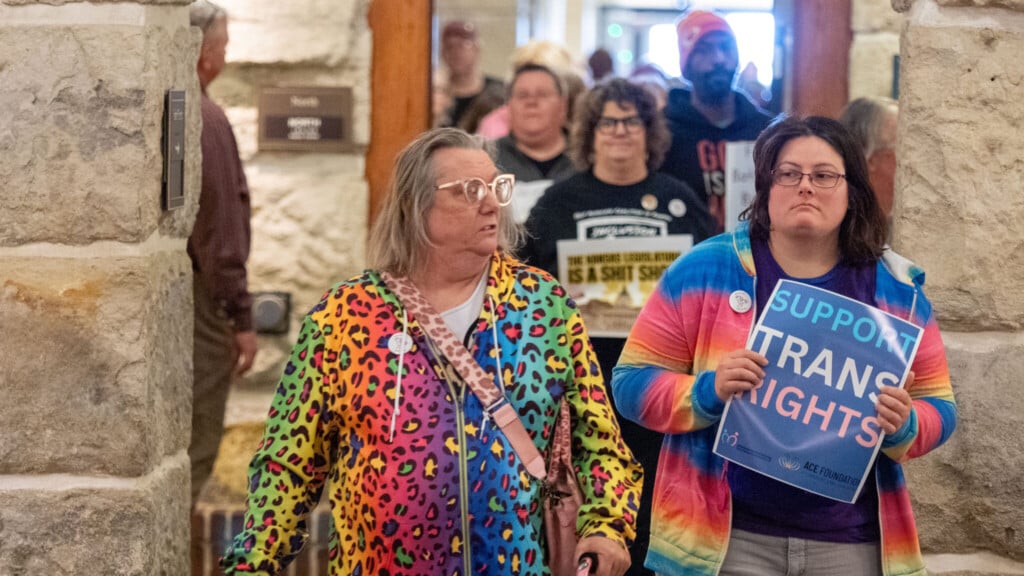KC Cares: Open ears and helping hands aid lagged child development at Infant-Toddler Services of Johnson County
“Why is my child not talking?” is a question Monica Ross hears a lot. Luckily, as program director for Infant-Toddler Services of Johnson County, there’s plenty she can do to help.
The best part? It’s all free to families who live in Johnson County.
Although they offer many different services, speech and language therapy is by far the most used, with about 70% of their clients needing the resource. Following behind are physical therapy and occupational therapy.
“A lot of children are referred to us because they may not be talking or babbling as much as we might expect or may not be saying as many words or putting words together,” Ross says.
Causes can vary from permanent or temporary hearing loss to a physical problem that makes it difficult to imitate sounds. At times, it’s not clear where the issue started, but that doesn’t mean they can’t help fix it.
Anyone can request an assessment to see if a child is delayed; The request doesn’t have to come from a medical professional. When Infant-Toddler Services screens kids, they’re looking for a delay of 25%, so a two-year-old experiencing a six-month delay would qualify.
According to Ross, as of November of this year, there were 2,507 children throughout the county currently receiving their services. That’s an increase from 2020 when they served 2,020 kids. By the time they age out at three, 37% of kids won’t need further services like the ones they got at Infant-Toddler Services, but the majority will need some sort of assistance. The non-profit helps families find continuing resources from school districts and other organizations.
Besides the lack of cost to families, another form of care that Infant-Toddler Services provides is help in what they call the ‘child’s natural environment.’ That means therapists work with kids where they’re comfortable—at home, at daycare, or even in a park or a library.
“We were in a home, and they were working on having a toddler pull up to stand. The physical therapist had the mom take the couch cushions off the couch so it was a little bit lower and easier for her to then pull herself up. That’s one of the nice things about being in the home. We can really see what’s going on, and we can help that family make small changes that make a really big difference,” Ross says.
They work with the family to set goals and see what everyone’s priorities are to come up with a plan that fits. Even older siblings can help and give encouragement.
“Sometimes, if you give a parent homework to do with their toddler, that’s really hard to do, because it doesn’t fit into their routine, but if you say, ‘Hey, during snack time, let’s work on repeating the name of the snack.’ Or, ‘Let’s give them half of the snack we might normally give them so they have an opportunity to ask for more,’” Ross says. “We really try and take what that family’s already doing and just model and add some strategies, so the family doesn’t feel like they have to start from scratch, but they have some new tricks, new tools in their toolbox.”
Increasing a child’s ability to communicate reaps big rewards.
“One of the best impacts we see is typically a closer parent-child connection and also typically that peer-to-peer connection. So, whether it’s with cousins, siblings, or little friends, that child is able to participate in activities at a level that matches where their peers are,” Ross says.
Sometimes, a little creativity helps. She remembers a girl with autism who was soon to turn three, and her mom wasn’t sure she was going to understand how to blow out candles or open presents.
“I came over there for a therapy session, and the mom had cooked a little birthday cake. She asked if, at that therapy session, we could have a practice birthday party, and we did. We sat the little girl in her little chair and sang to her, and her mom was just behind her and helped blow out the candles,” Ross says. “That was a really dawning moment—that it’s really important to find out what’s important to the family. A therapist can think it’s all about saying new words, but, really, it’s not always about those developmental milestones.”
Ross says that 20 years ago, families might only have heard of them through a doctor, but now they hear about them on social media and can access the website to fill out a screening form themselves. She says that especially helps them connect with families who speak English as a second language.
Heather Warner’s older son, Eli, got speech therapy and other help from Infant-Toddler Services. She turned to the organization again to help assist her younger son, Cooper, as well.
For Eli, with the preschool closed due to the pandemic, she didn’t have a reference for whether he was developmentally on track. On a friend’s recommendation, she contacted Infant-Toddler Services for a screening, which led to speech therapy.
“They’re very good at meeting you where you are at in life versus having their own ‘This is what we’re going to do’ type attitude,” Warner says.
Starting with signing and moving on to sounds and vocabulary, having the guidance from Infant-Toddler Services has made a big difference in her relationships, first with Eli, then with Cooper. “It’s allowed his dad and I to have tools to use versus just getting frustrated. We’ve been given tools to help him communicate with us,” she says.
Warner appreciates the overwhelming amount of encouragement she received from the speech therapist.
“They do not make you feel like you’re behind,” she says. “Mom guilt is one of the worst things I’ve experienced, and that is something I have never, ever felt with their agency. I’ve always felt supported, cared for, and understood where I am in life.”
For more information, visit itsjc.org.
Click below to read the January 2025 Issue of The Pitch Magazine:






